United States Secretary of the Army
The Secretary of the Army (SA, SECARM[2] or SECARMY) is a senior civilian official within the United States Department of Defense, with statutory responsibility for all matters relating to the United States Army: manpower, personnel, reserve affairs, installations, environmental issues, weapons systems and equipment acquisition, communications and financial management.
| United States Secretary of the Army | |
|---|---|
 | |
 Flag of the Secretary of the Army[1] | |
| United States Department of the Army | |
| Style | Mr. Secretary |
| Reports to | Secretary of Defense |
| Appointer | President of the United States with Senate advice and consent |
| Term length | No fixed term |
| Precursor | Secretary of War |
| Formation | September 18, 1947 |
| First holder | Kenneth Claiborne Royall |
| Succession | 2nd in SecDef succession |
| Deputy | Under Secretary of the Army Chief of Staff of the Army |
| Salary | Executive Schedule, Level II |
| Website | Official website |
The Secretary of the Army is nominated by the President of the United States and confirmed by the United States Senate. The Secretary is a non-Cabinet level official, subordinate to the Secretary of Defense.[3] This position was created on September 18, 1947, replacing the United States Secretary of War, when the Department of War was split into the Department of the Army and Department of the Air Force.[4]
On January 20, 2021, John E. Whitley was appointed as the Acting Secretary of the Army.
Roles and responsibilities
The Army senior leadership consists of two civilians; the Secretary of the Army and the United States Under Secretary of the Army—and two military officers of four-star rank—the Chief of Staff of the United States Army and the Vice Chief of Staff of the United States Army.
The Secretary of the Army (10 U.S.C. § 3013) is in effect the chief executive officer of the Department of the Army, and the Chief of Staff of the Army works directly for the Secretary. The Secretary presents and justifies Army policies, plans, programs, and budgets to the Secretary of Defense, other executive branch officials, and to the Congressional Defense Committees. The Secretary also communicates Army policies, plans, programs, capabilities, and accomplishments to the public. As necessary, the Secretary convenes meetings with the senior leadership of the Army to debate issues, provide direction, and seek advice. The Secretary is a member of the Defense Acquisition Board.
The Secretary of the Army has several responsibilities under the Uniform Code of Military Justice, including the authority to convene general courts-martial.[5]
Office of the Secretary of the Army
The Office of the Secretary of the Army is composed of the Under Secretary of the Army, the Assistant Secretaries of the Army, the Office of the Administrative Assistant to the Secretary of the Army, the General Counsel of the Department of the Army, the Inspector General of the Army, the Chief of Legislation, and the Army Reserve Forces Policy Committee. Other offices may be established by law or by the Secretary of the Army. No more than 1,865 Army officers on the active-duty list may be assigned or detailed to permanent duty in the Office of the Secretary of the Army and on the Army staff.[6]
- Under Secretary of the Army
- Assistant Secretary of the Army (Acquisition, Logistics, and Technology)
- Assistant Secretary of the Army (Civil Works)
- Assistant Secretary of the Army (Financial Management and Comptroller)
- Assistant Secretary of the Army (Installations, Energy and Environment)
- Assistant Secretary of the Army (Manpower and Reserve Affairs)
- General Counsel of the Army
- Administrative Assistant to the Secretary of the Army
- Inspector General of the Army

Chronological list of secretaries of the Army
Kenneth Claiborne Royall, the last secretary of war, became the first Secretary of the Army when the National Defense Act of 1947 took effect. Gordon Gray was the last Army Secretary to hold the Cabinet status, which was henceforth assigned to the Secretary of Defense.[4][7]
Prior military service is not a requirement, but several have served in the United States armed forces. Secretary Stone (1989-1993) is the only holder to serve in the military outside of the United States.
| No. | Image | Name | Term of office | President(s) served under |
|---|---|---|---|---|
| 1 | 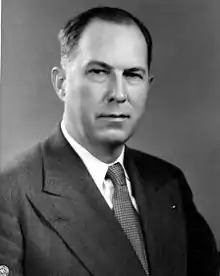 |
Kenneth Claiborne Royall | September 18, 1947 – April 27, 1949 | Harry S. Truman |
| 2 |  |
Gordon Gray[8] | April 28, 1949 – April 12, 1950 | |
| 3 |  |
Frank Pace | April 12, 1950 – January 20, 1953 | |
| – |  |
Earl D. Johnson Acting[8] |
January 20, 1953 – February 4, 1953 | Dwight D. Eisenhower |
| 4 |  |
Robert T. Stevens | February 4, 1953 – July 21, 1955 | |
| 5 |  |
Wilber M. Brucker | July 21, 1955 – January 19, 1961 | |
| 6 |  |
Elvis Jacob Stahr Jr. | January 24, 1961 – June 30, 1962 | John F. Kennedy |
| 7 |  |
Cyrus Roberts Vance | July 5, 1962 – January 21, 1964 | John F. Kennedy, Lyndon B. Johnson |
| 8 | 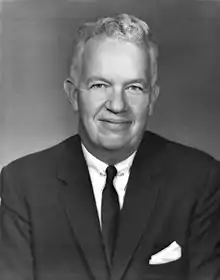 |
Stephen Ailes | January 28, 1964 – July 1, 1965 | Lyndon B. Johnson |
| 9 |  |
Stanley R. Resor | July 2, 1965 – June 30, 1971 | Lyndon B. Johnson, Richard Nixon |
| 10 |  |
Robert F. Froehlke | July 1, 1971 – May 14, 1973 | Richard Nixon |
| 11 | 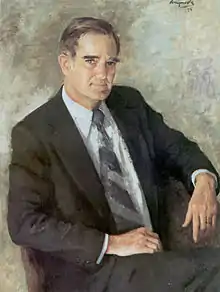 |
Howard H. Callaway | May 15, 1973 – July 3, 1975 | Richard Nixon, Gerald Ford |
| – | 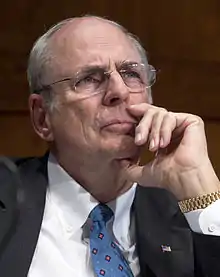 |
Norman R. Augustine Acting[8] |
July 3, 1975 – August 5, 1975 | Gerald Ford |
| 12 |  |
Martin R. Hoffmann | August 5, 1975 – January 20, 1977 | |
| 13 | 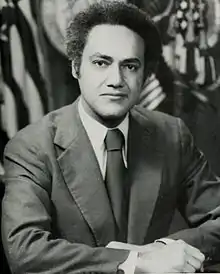 |
Clifford Alexander Jr. | February 14, 1977 – January 20, 1981 | Jimmy Carter |
| – |  |
Percy A. Pierre Acting[8] |
January 21, 1981 – January 29, 1981 | |
| 14 |  |
John O. Marsh Jr. | January 30, 1981 – August 14, 1989 | Ronald Reagan, George H. W. Bush |
| 15 |  |
Michael P. W. Stone | August 14, 1989 – January 20, 1993 | George H. W. Bush |
| – |  |
John W. Shannon Acting[9] |
January 20, 1993 – August 26, 1993 | Bill Clinton |
| – |  |
Gordon R. Sullivan Acting[10][11] |
August 28, 1993 – November 21, 1993 | |
| 16 |  |
Togo D. West Jr. | November 22, 1993 – May 4, 1997 | |
| – |  |
Robert M. Walker Acting[8] |
December 2, 1997 – July 1, 1998 | |
| 17 | 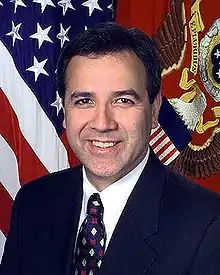 |
Louis Caldera | July 2, 1998 – January 20, 2001 | |
| – |  |
Gregory R. Dahlberg Acting |
January 20, 2001 – March 4, 2001 | George W. Bush |
| – |  |
Joseph W. Westphal Acting[8] |
March 5, 2001 – May 31, 2001 | |
| 18 |  |
Thomas E. White | May 31, 2001 – May 9, 2003 | |
| – | 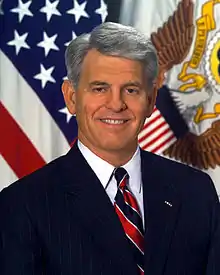 |
Les Brownlee Acting |
May 10, 2003 – November 18, 2004 | |
| 19 | 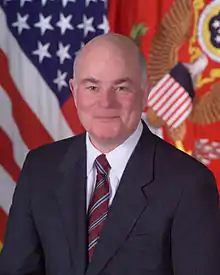 |
Francis J. Harvey | November 19, 2004 – March 9, 2007 | |
| 20 |  |
Pete Geren | March 9, 2007 – September 21, 2009 | George W. Bush, Barack Obama |
| 21 |  |
John M. McHugh | September 21, 2009 – November 1, 2015 | Barack Obama |
| – |  |
Eric Fanning Acting |
November 3, 2015 – January 11, 2016 | |
| – |  |
Patrick Murphy Acting |
January 11, 2016 – May 17, 2016 | |
| 22 |  |
Eric Fanning | May 17, 2016 – January 20, 2017 | |
| – | 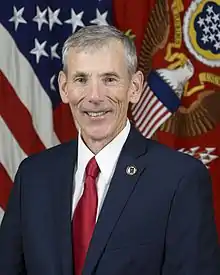 |
Robert Speer Acting |
January 20, 2017 – August 2, 2017 | Donald Trump |
| – |  |
Ryan McCarthy Acting |
August 2, 2017 – November 20, 2017 | |
| 23 | 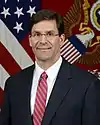 |
Mark Esper | November 20, 2017 – July 23, 2019[12] | |
| – |  |
Ryan McCarthy Acting |
June 24, 2019 – July 15, 2019 | |
| 24 |  |
Ryan McCarthy | July 23, 2019 – January 20, 2021 Acting: July 23, 2019 – September 30, 2019 | |
| – | 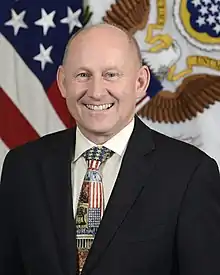 |
John E. Whitley Acting |
January 20, 2021 – present | Joe Biden |
References
- http://www.apd.army.mil/pdffiles/r840_10.pdf Archived June 7, 2010, at the Wayback Machine, accessed on January 4, 2012.
- "SECARM sets goals, timeline for Rapid Capabilities Office: AUSA exclusive". defensenews.com. October 3, 2016. Retrieved January 19, 2018.
- "US CODE: Title 10,3013. Secretary of the Army". Retrieved September 22, 2007.
- Bell, William Gardner (1992). ""Kenneth Claiborne Royall"". Secretaries of War and Secretaries of the Army: Portraits and Biographical Sketches. United States Army Center of Military History. Retrieved September 22, 2007.
- "Secretary of the Army". Archived from the original on September 21, 2007. Retrieved September 22, 2007.
- "US CODE: Title 10,3014. Office of the Secretary of the Army". Retrieved September 22, 2007.
- Bell, William Gardner. ""Intro - Secretaries of War & Secretaries of the Army"". Secretaries of War and Secretaries of the Army: Portraits & Biographical Sketches. Retrieved September 22, 2007.
-
- Bell, William Gardner (1992). Secretaries of War and Secretaries of the Army: Portraits and Biographical Sketches. Washington, D.C.: United States Army Center of Military History.
-
- Schmitt, Eric (August 28, 1993). "Acting Army Secretary, Accused Of Shoplifing, Is Placed on Leave". The New York Times. Retrieved June 29, 2019.
- Miller, Bill (September 22, 1993). "Acting Army Secretary Admits Shoplifting". The Washington Post. Retrieved June 29, 2019.
- Griffith, Stephanie; Miller, Bill (August 28, 1993). "Secretary of the Army Accused of Shoplifting". The Washington Post. Archived from the original on October 25, 2012 – via www.highbeam.com.
- The Daily Sentinel (Ohio/West Virginia), Acting Army Chief Ticketed for Shoplifting, August 29, 1993
- U.S. Organization Chart Service, Department of Defense Fact Book, 2006, page 17
- Dickstein, Corey (June 21, 2019). "Former Ranger McCarthy will take on duties of Army secretary on Monday". Stars and Stripes. Retrieved June 29, 2019.
While Esper is serving as acting defense secretary, he will technically retain the title of secretary of the Army, one of the officials said.


